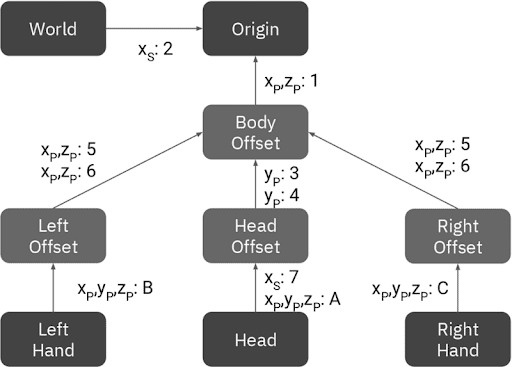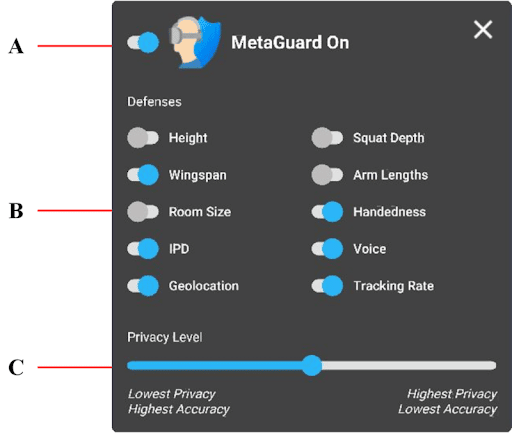Researchers at UC Berkeley and Munich Technical University are working on a kind of “incognito mode” for the metaverse.
The metaverse’s new feature, the “incognito mode”
The idea of the “incognito mode” to be added to immersive digital worlds is similar to what can currently be used on web browsers to hide one’s movements online.
The tool, called MetaGuard, would block companies from tracking users’ digital footprints, including identity data, geolocation, and movements.
The goal is to allow the user to navigate incognito within the metaverse, without having all of their actions and information tracked, most importantly, where and how the person is interacting with VR.
A little later we will go into more technical details and what has just been described will become clearer.
Contrary to popular belief, the incognito mode of browsers allows browsing data to be hidden only locally. Therefore, it does not prevent the collection of information by the web servers you visit and should not be confused with a tool that provides anonymity, such as Tor.
The MetaGuard tool in detail, features, and properties of the metaverse’s new incognito mode
MetaGuard is broadly defined as an incognito mode for virtual reality (VR) and attempts to make up for the shortcomings presented by Web 2.0. It can be said that the work is necessary to say the least, as the sensitive data that can be collected through a VR experience could be more invasive than that generated by “simple Google browsing.”
The new tool created is based on a technique called Differential Privacy. Basically, it involves adding enough “noise” – jargon used to define data distortion – within the collected metrics so the information cannot be traced back to the person who generated it.

This type of model allows the user’s telemetry data to be hidden from the server by adding “intermediate offset objects” in numbers proportional to the level of privacy chosen by the user.
The latter in particular depends on the layers of defenses added through the dedicated interface of the MetaGuard tool within virtual reality.

The user, depending on preferences, will have to choose the optimal trade-off level between privacy and accuracy.
Also, for those interested in going into even more technical details, the three authors, Vivek Nair (UC Berkeley), Gonzalo Munilla Garrido (Technical University of Munich), and Dawn Song (UC Berkeley), have published a paper via ArXiv.
About the new project, Nair explains that:
“It has the potential to significantly improve the privacy of VR users, with our experiments showing an over 90 percent reduction in attack accuracy for several private data attributes, and a 95 percent reduction in deanonymization of users.”
Companies unwilling to support the incognito tool in their metaverse
Unfortunately, as you can well understand, some virtual reality platforms, such as VRChat, have decided to block tools such as MetaGuard for user privacy protection.
In this regard, Vivek Nair, with some discouragement, states that:
“Unfortunately, some companies have already begun moving to block this from being a possibility. In mid-July, the researchers disclosed their findings about VR privacy and their work on MetaGuard to the VRChat community.”
It then goes on to reveal that:
“VRChat is one of the largest metaverse applications and we wanted to give them time to respond to our privacy concerns before going public. We shared our source code for our prototype MetaGuard plugin for VRChat with them at that time.
Just a few days later, VRChat announced its decision to ban all client mods from the platform and use DRM tools to make modding impossible. Therefore, VRChat is now one of the few major applications where MetaGuard cannot be used.”
Clearly, should this trend continue, the privacy of every single user could be in serious jeopardy. Not only could information about a person’s daily habits continue to be collected, as is already the case with big tech, but it will usher in a new era where big companies could get hold of our telemetry data.
The future of the metaverse, between initial hype and current flop
At present, the future of the metaverse appears very uncertain. There is still no idea that can be common to all and that can function as a standard that draws guidelines for the entire field.
Many are trying to provide a clear definition regarding the concept of these new virtual worlds.
First of all Eric Schmidt, the former CEO of Google, revealed that he is against the current development of the metaverse, mainly because:
“There is still not a clear definition of the concept and how it will affect people’s lives”.
If you really want to be nitpicky, the definition that best matches current developments is that the metaverse can be seen as a set of immersive, personalized, and interconnected virtual reality worlds in which people can shop, work and play.
Also expressing his thoughts on the future of the metaverse is Vitalik Buterin, whose idea, shared in a tweet, is that none of the existing attempts will go anywhere:
The "metaverse" is going to happen but I don't think any of the existing corporate attempts to intentionally create the metaverse are going anywhere. https://t.co/tVUfq4CWmP
— vitalik.eth (@VitalikButerin) July 30, 2022
Then some mock Mark Zuckerberg‘s overinvestment, calling the virtual world technology he is developing, Horizon Worlds, on par with that of a 1997 video game:
Facebook spent $10 billion on metaverse projects in 2021.
The graphics look like they came out of a computer game developed in 1997. pic.twitter.com/KuGMBMF3O1
— Chris Bakke (@ChrisJBakke) August 17, 2022
But he is not alone. Regarding Horizon’s latest expansion in Spain and France, one user calls Zuckerberg’s virtual selfie “ugly as hell,” then rages again by claiming that Meta’s metaverse strategy will eventually die in obscurity:
Mark Zuckerberg launches Horizon Worlds in France and Spain with an eye-gougingly ugly VR selfie. Meta's metaverse ploy is surely dying in the dark. pic.twitter.com/j0l6yTYye4
— Ordinary Things (@ordinarytings) August 16, 2022
Meta, The Sandbox and Decentraland Performance
Indeed, the current numbers speak for themselves. According to financial results for the second quarter of 2022, the division dedicated to the development of the new virtual reality project, Reality Labs, posted a loss of as much as $2.8 billion.
This, however, is not the only reality to suffer. Virtual land prices of major metaverses, such as The Sandbox and Decentraland, have plummeted by 90%, also complicit in the current bear market that has affected the entire cryptocurrency sector.
The same fate has befallen users of the two virtual worlds just mentioned, who, due to the huge loss of interest, have experienced a steep drop in activity. As of June 2022, The Sandbox had less than 1,000 active users, while Decentraland did not even reach 100.
Will this just be a bad period before recovery, or has this technology been overrated because of the initial hype?
It will certainly have its upsides with its innovative applications in different areas, but many realities will not survive in the future.
 en.cryptonomist.ch
en.cryptonomist.ch